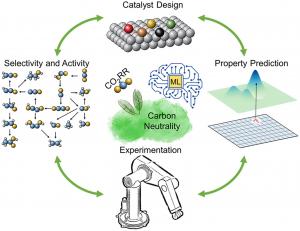Revolutionizing Carbon Neutrality: Machine Learning Paves the Way for Advanced CO2 Reduction Catalysts
USA, March 18, 2024 /EINPresswire.com/ -- A perspective highlights the transformative impact of machine learning (ML) on enhancing carbon dioxide reduction reactions (CO2RR), steering us closer to carbon neutrality. It emphasizes ML's ability to swiftly predict catalyst properties, innovate in the design of catalysts and electrodes, and elevate experimental synthesis with heightened efficiency and precision.
The quest for carbon neutrality has led scientists to explore innovative strategies to reduce atmospheric carbon dioxide reduction reactions (CO2). The carbon dioxide reduction reactions (CO2RR) offers a promising avenue by converting CO2 into value-added chemicals. However, the traditional trial-and-error approach in catalyst development is time-consuming and costly, necessitating novel approaches for rapid and efficient advancements.
In a perspective (doi: 10.1016/j.esci.2023.100136) published in the journal eScience, highlights machine learning's (ML) capacity to accelerate the prediction of catalyst properties, enhance the design of novel catalysts and electrodes, and support experimental synthesis with greater efficiency and accuracy.
The research delves deeply into ML revolutionary impact on enhancing and optimizing catalyst design for CO2RR, a key element in the quest for carbon neutrality. Leveraging advanced ML algorithms has allowed for a significant speed-up in identifying and refining catalysts, making the experimental synthesis process more streamlined than ever before. This methodology not only facilitates the rapid discovery of effective catalysts but also improves the accuracy in predicting their performance, dramatically cutting down the traditional time and resources needed for catalyst development. Highlighting ML's capability, the study sets a new standard for sustainable environmental solutions, showcasing its potential to bring about faster, more precise advancements in CO2RR catalyst technology, and encouraging future explorations in this vital field.
Prof. Zongyou Yin, one of the study's lead authors, emphasized, "Machine learning revolutionizes our approach to developing CO2 reduction catalysts, enabling faster, data-driven decisions that drastically cut down research time and accelerate our progress towards carbon neutrality."
The integration of machine learning into the development of catalysts for carbon dioxide reduction is a promising step towards achieving carbon neutrality. As the world continues to seek sustainable and efficient solutions to combat climate change, the innovative application of ML in environmental science opens new horizons for research and development.
DOI
10.1016/j.esci.2023.100136
Original Source URL
https://doi.org/10.1016/j.esci.2023.100136
Funding information
The authors gratefully express gratitude to all parties who have contributed toward the success of this project, both financially and technically, especially the S&T Innovation 2025 Major Special Programme (Grant No. 2018B10022) and the Ningbo Commonweal Programme (Grant No. 2022S122) funded by the Ningbo Science and Technology Bureau, China, as well as the UNNC FoSE Faculty Inspiration Grant, China. The authors would like to acknowledge the support from the Ningbo Municipal Key Laboratory on Clean Energy Conversion Technologies (2014A22010) as well as the Zhejiang Provincial Key Laboratory for Carbonaceous Wastes Processing and Process Intensification Research funded by the Zhejiang Provincial Department of Science and Technology (2020E10018). We also acknowledge the support from the ANU Futures Scheme (Q4601024).
Lucy Wang
BioDesign Research
email us here
Legal Disclaimer:
EIN Presswire provides this news content "as is" without warranty of any kind. We do not accept any responsibility or liability for the accuracy, content, images, videos, licenses, completeness, legality, or reliability of the information contained in this article. If you have any complaints or copyright issues related to this article, kindly contact the author above.

